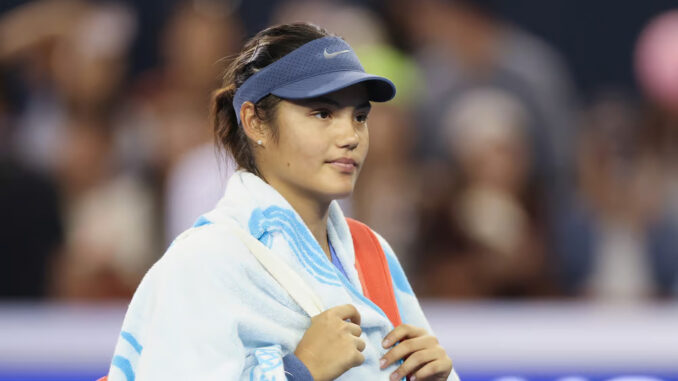
The blistering hard courts of the Wuhan Open were poised to be a proving ground for Emma Raducanu, a canvas where the 22-year-old British No. 1 could paint her 2025 resurgence with bold strokes of resilience and refined skill. Instead, the scorching September heat turned the arena into a gauntlet, pushing her to the edge of her physical limits in a way no rally or serve could have anticipated. Facing American qualifier Ann Li in the first round, Raducanu arrived with momentum from a spirited performance against Jessica Pegula at the China Open in Beijing. But under a punishing 36-degree Celsius sun and humidity nearing 70 percent, what began as an opportunity for triumph unraveled into a gripping moment of human fragility that captivated the tennis world.
Ranked No. 30 and radiating a quiet determination after months of honing her game, Raducanu stepped onto Centre Court with her signature fire. Yet the oppressive conditions were unrelenting. By the second set, trailing 6-1, 4-1, her body faltered—dizziness clouded her focus, her breathing grew ragged, and her face flushed with the strain of the heat. As she gripped her chest, the stadium’s energy shifted from anticipation to alarm. Medical staff rushed to her side, their swift checks of her blood pressure and temperature underscoring the gravity of the moment. With a heavy heart, Raducanu withdrew, her second early exit in Asia this season after tough battles in Seoul and Beijing. The retirement wasn’t just a lost match; it was a stark reminder of the grueling toll the professional circuit demands, even from its brightest stars.
Raducanu’s struggle was not hers alone. The Wuhan Open became a crucible for others too, as the heat claimed multiple casualties. Jelena Ostapenko, the 2021 French Open champion, also retired mid-match against Sorana Cirstea, felled by heat stroke. Later, she took to social media with a blend of regret and resolve: “It was a tough day. I suffered a heat stroke today. Thank you China for the atmosphere, emotions and incredible energy from the crowd. I am truly sorry that I had to finish the match this way. I will be back stronger next year.” In Shanghai, Novak Djokovic battled visible nausea, later describing the conditions as “brutal,” while Holger Rune’s impassioned plea—“Why doesn’t the ATP have a heat rule? You want a player to die on the court?”—sparked a broader reckoning on player welfare. Spurred by the outcry, Wuhan organizers adjusted match start times from 1 p.m. to 3 p.m., a modest gesture toward safeguarding athletes under a relentless sky.
In the midst of the turmoil, Ann Li, Raducanu’s opponent, paused her post-match interview to offer a touch of grace: “First, I want to wish Emma a fast recovery. Not sure what, but looked like she wasn’t feeling good. But yeah, tough match last time, so I knew it was going to be tough, but I wish her to feel better.” Her words, laced with empathy, highlighted the unspoken bond among players, a thread of solidarity woven through the sport’s fierce competition.
Three days after the ordeal, Raducanu reappeared—not on the court, but in a stark hospital room in Wuhan, her resolve shining through. In a heartfelt Threads post, she shared a snapshot of herself in a navy Nike hoodie, sunglasses masking the strain, perched on a hospital bed. Her message was a beacon of strength: “Last day at the doctors in Wuhan. Feeling better now. Shame I couldn’t continue there, but thank you for the messages,” she wrote, signing off with a bandaged heart emoji. The image of a champion regrouping resonated deeply, her words a bridge between vulnerability and defiance. Fans responded with a flood of encouragement, their support a lifeline as she processed the sting of an interrupted campaign.
The Asian swing has tested Raducanu’s mettle, yielding just two wins across five matches in Seoul, Beijing, and Wuhan. The points needed to secure a seeded spot at the Australian Open—a goal she holds dear—slipped further away. Yet her ambition remains unquenched. Before Wuhan, she shared her roadmap: “Being seeded for Australia is a big target for me over the next few weeks. I think the higher you can go, the better it is, but it is still down to the luck of the draw. I’ve just been happy with the improvements in the last few weeks I’ve made in my game, and I just want to keep going with that.” Her clarity of purpose, even in adversity, reveals a player undaunted by the climb ahead.
Her path forward is clear and crowded with opportunity. A wildcard entry into the WTA 500 in Ningbo (October 13–19) pits her against a formidable field, including Pegula, Mirra Andreeva, and Jasmine Paolini—a tournament she missed last year due to injury. Next, Tokyo’s Toray Pan Pacific Open (October 20–26) marks her debut in another WTA 500 event, where she’ll face titans like Elena Rybakina, Naomi Osaka, and defending champion Qinwen Zheng. The Hong Kong Tennis Open (October 27–November 2) caps her Asian journey, offering a final shot at ranking points and momentum. Each event is a chance to reclaim her narrative, to transform setbacks into stepping stones.
Raducanu’s story—from her meteoric US Open triumph at 18 to the relentless demands of the pro tour—is a tapestry of highs and hurdles. The Wuhan health scare, a clash of ambition against physical limits, adds a poignant thread to her saga. Yet, in her hospital-room reflection, in the quiet power of her words, she remains a magnetic figure. Tennis asks for everything—heart, body, and soul—and Raducanu offers it unflinchingly, her spirit bandaged but blazing. As she strides toward Ningbo, the world holds its breath, not for her stumbles, but for the soaring comeback of a champion who refuses to be defined by defeat.
Leave a Reply